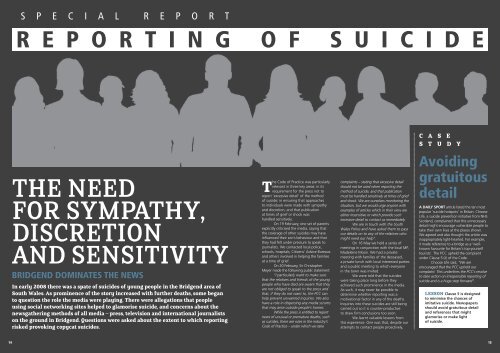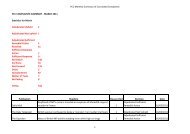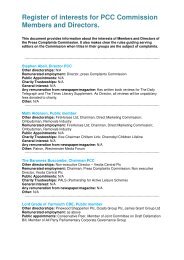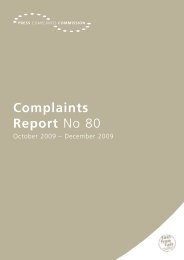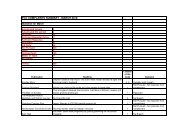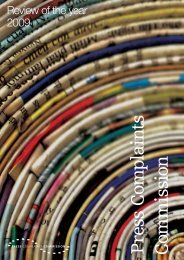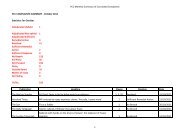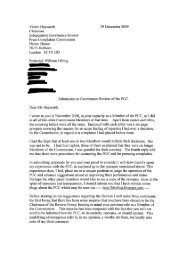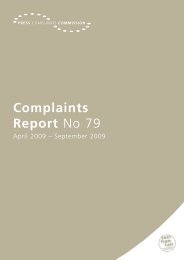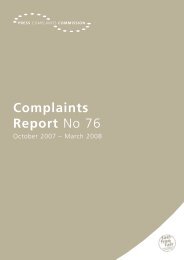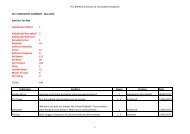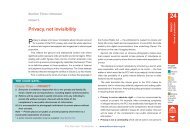2008 - Press Complaints Commission
2008 - Press Complaints Commission
2008 - Press Complaints Commission
You also want an ePaper? Increase the reach of your titles
YUMPU automatically turns print PDFs into web optimized ePapers that Google loves.
S P E C I A L R E P O R T<br />
R E P O R T I N G O F S U I C I D E<br />
C A S E<br />
S T U D Y<br />
THE NEED<br />
FOR SYMPATHY,<br />
DISCRETION<br />
AND SENSITIVITY<br />
BRIDGEND DOMINATES THE NEWS<br />
In early <strong>2008</strong> there was a spate of suicides of young people in the Bridgend area of<br />
South Wales. As prominence of the story increased with further deaths, some began<br />
to question the role the media were playing. There were allegations that people<br />
using social networking sites helped to glamorise suicide, and concerns about the<br />
newsgathering methods of all media – press, television and international journalists<br />
on the ground in Bridgend. Questions were asked about the extent to which reporting<br />
risked provoking copycat suicides.<br />
T<br />
he Code of Practice was particularly<br />
relevant in three key areas: in its<br />
requirement for the press not to<br />
report ‘excessive detail’ of the method<br />
of suicide; in ensuring that approaches<br />
to individuals were made with sympathy<br />
and discretion; and that publication<br />
at times of grief or shock was<br />
handled sensitively.<br />
On 19 February, one set of parents<br />
explicitly criticised the media, saying that<br />
the coverage of other suicides may have<br />
influenced their son’s behaviour and that<br />
they had felt under pressure to speak to<br />
journalists. We contacted local police,<br />
schools, hospitals, Citizens’ Advice Bureaux<br />
and others involved in helping the families<br />
at a time of grief.<br />
On 20 February, Sir Christopher<br />
Meyer made the following public statement:<br />
“I particularly want to make sure<br />
that the relatives and friends of the young<br />
people who have died are aware that they<br />
are not obliged to speak to the press and<br />
that, if they do not want to, the PCC can<br />
help prevent unwanted inquiries. We also<br />
have a role in dispersing any media scrums<br />
that may arise outside people’s homes.<br />
While the press is entitled to report<br />
news of unusual or premature deaths, such<br />
as suicides, there are rules in the industry’s<br />
Code of Practice – under which we take<br />
complaints – stating that excessive detail<br />
should not be used when reporting the<br />
method of suicide, and that publication<br />
must be handled sensitively at times of grief<br />
and shock. We are ourselves monitoring the<br />
situation, but we would urge anyone with<br />
examples of articles which in their view are<br />
either insensitive or which provide such<br />
excessive detail to contact us immediately.<br />
We are in touch with the South<br />
Wales Police and have asked them to pass<br />
our details on to any of the relatives who<br />
might need our help”.<br />
On 16 May we held a series of<br />
meetings in conjunction with the local MP,<br />
Madeleine Moon. We had a private<br />
meeting with families of the deceased,<br />
a private lunch with local interested parties<br />
and a public meeting to which everyone<br />
in the town was invited.<br />
We were told that the suicides<br />
were taking place long before they<br />
achieved such prominence in the media.<br />
As such, it may never be possible to<br />
determine whether reporting was a<br />
motivational factor in any of the deaths.<br />
Inquiries into these suicides are still being<br />
carried out so it is counter-productive<br />
to draw firm conclusions too soon.<br />
We learnt valuable lessons from<br />
this experience. One was that, despite our<br />
attempts to contact people proactively,<br />
Avoiding<br />
gratuitous<br />
detail<br />
A DAILY SPORT article listed the ten most<br />
popular ‘suicide hotspots’ in Britain. Choose<br />
Life, a suicide prevention initiative from NHS<br />
Scotland, complained that this unnecessary<br />
detail might encourage vulnerable people to<br />
take their own lives at the places shown.<br />
We agreed and also thought the article was<br />
inappropriately light-hearted. For example,<br />
it made reference to a bridge as a 'wellknown<br />
favourite for Britain's top-yourself<br />
tourists'. The PCC upheld the complaint<br />
under Clause 5 (ii) of the Code.<br />
Choose Life said, “We are<br />
encouraged that the PCC upheld our<br />
complaint. This underlines the PCC's resolve<br />
to take action on irresponsible reporting of<br />
suicide and is a huge step forward”.<br />
LESSON Clause 5 is designed<br />
to minimise the chances of<br />
imitative suicide. Newspapers<br />
should avoid gratuitous detail<br />
and references that might<br />
glamorise or make light<br />
of suicide.<br />
14 15


